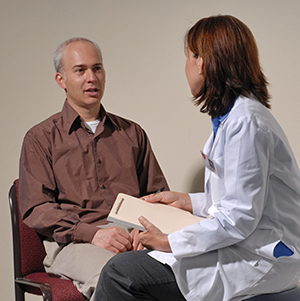Gay, Lesbian, and Transgender Health Issues
Gay, Lesbian, and Transgender Health Issues
People of any sexual orientation can face health problems. But people who are gay, lesbian, or transgender may be at greater risk for health problems because they don't always see a healthcare provider when they need to. This may be because they feel embarrassed, have had a bad experience, fear judgment, or have a healthcare provider who is uninformed.
Here are some health issues you should be aware of and talk about with your healthcare provider.
Hormone issues
As part of the cross-gender transition, transgender people may take hormones in order to achieve masculine or feminine effects. Those hormones carry risks:
Low or high blood pressure
Blood clots
Dehydration and electrolyte imbalance
Liver damage
Sometimes, a transgender person buys hormones from a nonmedical provider. This may be because the therapy isn't covered by insurance. Or it could be because the person doesn't want to seek medical care. This can result in taking the wrong amount of the hormone and may increase the chance for side effects. To limit the risks, a healthcare provider should closely watch hormone therapy.
Cancer
Transgender people are at a slightly higher risk of developing cancer tied to hormone use. Depending on the stage of transition, the breasts, uterus, ovaries, prostate, or liver can be affected.
Prostate screening in men, and breast and pelvic exams in women, should be a part of routine health care. Although you might face challenges dealing with healthcare issues, don't delay or skip these exams. Avoiding preventive screening could result in a delay in the diagnosis and treatment of any cancer.
Mental health issues
Gay, lesbian, and transgender people often have mental health issues as they struggle to identify with their sexuality. You may have a hard time sharing such personal information with family and friends. You may worry about how loved ones will react. Or you may feel lonely because you don't want to tell anyone, even those close to you. You may feel depressed or anxious because of this lack of support or acceptance from friends and family. Work can also trigger these issues. But if you don't seek treatment, your risk for suicide increases.
Sexually transmitted diseases
Sexually transmitted diseases (STDs) include human papillomavirus, hepatitis A and B, HIV, syphilis, chlamydia, and gonorrhea. Some STDs can be treated, but some can be fatal. They can affect people no matter what their sexual orientation is. Certain gay, lesbian, and transgender people may not want to practice safe sex. And some have lifestyles that increase their risk. Practicing safe sex can limit your chances of getting or passing on an STD. Seek prompt medical care at the first sign of symptoms. Don't put off a visit to the healthcare provider because you are embarrassed or fear judgment.
Substance abuse problems
Gay, lesbian, and transgender people often suffer from substance abuse problems. These include tobacco, alcohol, and illegal drugs. The reason may be partly because people in this group face challenges as they strive to find their place in society.
Cardiovascular problems
Obesity, smoking, hormone use, and high blood pressure are common among gay, lesbian, and transgender people. These factors put a person at risk for heart disease. Cardiovascular disease can lead to heart attack and stroke. You should get regular checkups to help prevent heart disease. Also control health conditions like high blood pressure and obesity, and live a healthy lifestyle.
Obesity
An unhealthy body weight can contribute to a number of health problems. These range from cardiovascular disease to depression. A healthy lifestyle should be a part of any gay, lesbian, or transgender person's daily routine. Try to get regular exercise and follow a healthy diet to get to and maintain a healthy weight.
Be aware of your increased risk for health problems because of your sexual orientation. Set up a good relationship with a healthcare team to help keep you in good physical and mental health.
Updated:
July 07, 2018
Reviewed By:
Horowitz, Diane, MD,Kolbus, Karin, RN, DNP, COHN-S
